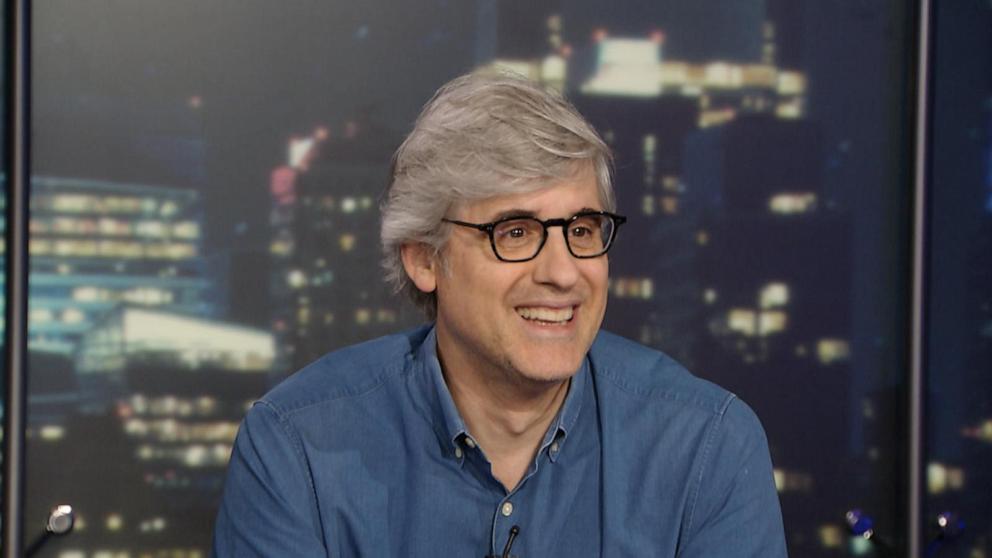Mo Rocca portrays late triumphs in life in his new book “Roctogenarians”

CBS Sunday Morning correspondent Mo Rocca discusses with ABC News the late-in-life success stories he presents in “Roctogenarians: Late in Life Debuts, Comebacks, and Triumphs.”
Rocca argues that people’s greatest triumphs often come later in life. Rocca’s book is a celebration of role models who found their way later in life despite societal expectations. It’s a testament to their resilience and a call to honor and respect such late-life triumphs, he says.
Rocca mentioned that many people achieve great things later in life because they are free and don’t worry about what others think. They worry less and older people often have better stories to tell.
ABC News met with Rocca to discuss more about his new book.
ABC NEWS: Can the greatest triumphs come later in life? Popular “CBS Sunday Morning” correspondent and former “Daily Show” star Mo Rocca says it’s absolutely possible. And he has plenty of examples in his new book, “Roctogenarians: Late in Life Debuts, Comebacks, and Triumphs.”
Mo Rocca and co-author Jonathan Greenberg tell the stories of some people you know, many you don’t, who made some of their greatest mark on the world in their golden years. Mo, thank you so much for being here. Nice to talk to you.
MO ROCCA: Trevor, it’s great to be here.
ABC NEWS: I know you already have “Mobituaries” or “Roctogenarians.” Was this topic chosen just for the pun?
ROCCA: Yes. I want to use my name as much as possible. I’m running out of names at this point. But yes, I liked it. We had talked about Moroccans, but it had too many syllables.
ABC NEWS: Right. I think you nailed it with the Roctogenarians. You tell a great story from an interview you did, I think nine years ago, a decade ago, with Chance the Rapper, where you asked him, “I’m 46. Am I too old to be a rapper?” And he said, kind of joking but not seriously, “Some people would say you’re too young.”
ROCCA: Yeah, it was kind of because my question was actually meant as a laugh, and it was kind of a corny joke. And when he responded like that, he actually said maybe it’s too early for you to be a rapper, there was laughter, but he was kind of serious. And I was thunderstruck because I thought, you know, I had internalized the idea that I was over the hill at 46, that it was too late for me to do something new.
But I think this insidious notion that you’re over the hill at 60, 50, or 40 is so deeply rooted in our culture that my co-author and I wanted to offer a counterpoint.
ABC NEWS: There you have it. You’ve interviewed so many people over the years. Is there anything about people in their later years that you find particularly interesting when you talk to them?
ROCCA: Yes. As people get older, they care less about what other people think of them. And I think that’s very liberating. And I think there’s a good reason why so many people do things and achieve things in their advanced years, because they’re unattached or they don’t worry about what other people are going to think. They worry less. So that’s one thing. And older people just have better stories to tell.
ABC NEWS: Did you have any preconceived ideas about these types of people that you found out after interviewing all these people were maybe wrong?
ROCCA: I think the biggest prejudice is the fearlessness of many people and that they worry less as they get older. And I would have thought that the less time you have on the other side, the more you feel a sense of urgency. And indeed, these people were all very present.
ABC NEWS: At the beginning of the interview we mentioned “Mobituaries,” which is about looking at people who have already passed away. You talk to people who are older but who have not yet died. Does it change your attitude to these stories when the people have already passed away?
ROCCA: Well, I’ve gone from the dead to the pre-dead. I like to call them that. It makes me appreciate even more those people who do something late in life to improve a world that they wouldn’t otherwise really enjoy.
And I think there is something very powerful about that. I think it is quite obvious in the current discussion, but I think there is something very powerful about public servants doing something for a better world, a world that they will enjoy for a few years at best. There is something very powerful about that.
ABC NEWS: I remember the saying, “A society becomes truly great when people plant trees in whose shade they will never sit.”
ROCCA: I like that. And would you please embroider that on a pillow for me?
ABC NEWS: I will take care of it immediately.
ROCCA: That’s a really beautiful saying. I don’t know the saying, but it’s true.
ABC NEWS: Yes. I’m not sure where the saying came from, but I believe it is a saying. Mo, as long as we have you, I wouldn’t normally ask you that. I hope it won’t be relevant for many decades, but it’s a question we would normally ask someone in their later years. I’m going to ask you the question now: How would you like to be remembered?
ROCCA: The first line of my obituary should be: Mo Rocca, comma, who interested people in things they didn’t expect to be interested in, comma, died today, period. He was 146 years old. It’s about that part of the sentence, right? Right in the middle of the first sentence. That’s where the gist is. That’s where the action is.
ABC NEWS: A man who has always loved an independent set. Mo Rocca, thank you so much for being here. It’s a pleasure to speak with you. The book is called “Roctogenarians: Late in Life Debuts, Comebacks, and Triumphs.” It’s in stores right now.



